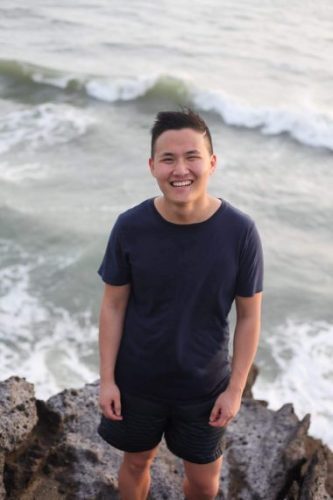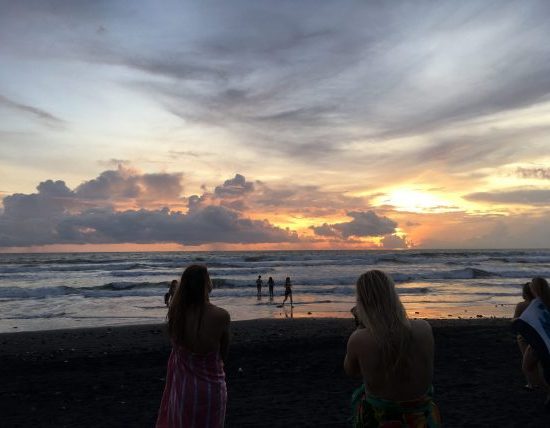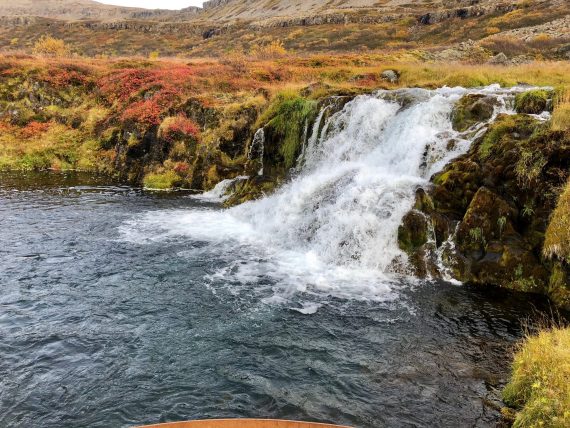
Week 2: Water
Water. It’s critical to our lives as humans. It can be dangerous or it can be beautiful. We’re very fortunate to have access to so many water sources here in Hamilton, whether it’s any of the countless lakes around Colgate and the State or the myriad hikes in the area that lead to waterfalls. Despite its abundance in Upstate New York, other locations across the country and the globe aren’t as lucky. This week your task is simple: tell us about water. Is there a daily deluge of rain or has it been dry for weeks? Tell us about places you’ve been where water was at the center of your focus. Where you are studying how do people interact with one of our planets greatest resource?
Renee Congdon
When I first read this prompt, I wasn’t sure what I could possibly write about. Madrid isn’t a coastal city, and as far as I could remember, I didn’t spend all that much time around water. However, as I started to mull it over more, smaller moments and memories related to water came flooding back (pun intended). I’m going to focus on one water memory in particular that happened near the beginning of my trip.
During our second week in Spain, we decided to take a day trip to Noia, a small town in Galicia. All of us on the trip went together, making the hour-long bus trek together from Santiago de Compostela before arriving in the small seaside town. We searched for another hour for the numerous beaches that Google Maps claimed Noia had, but to little avail. We could only find the bay (with no shoreline accessible). Eventually, we decided to venture further out, following the jagged edge of the coast as we passed from the touristy zone to the residential zone, stepping carefully across a creaky wooden bridge and holding our noses at the unmistakably sulfuric smell arising from some stagnant water below us. Finally, we turned a corner, shimmying along a small dirt path, and found what I believe is quite possibly the smallest beach in the entire world. It was a patch of sand about 20 feet long and 10 feet wide, but it was a beach nonetheless. The water was clearer than glass, showing the sandy floor below dotted with sea glass, rocks, and shells. I kicked off my sandals and began to wade into the water, looking down at my feet as I walked, enchanted by how clear and cold the water was. I shuffled along like that for about 10 minutes, picking up small rocks and shells as I went. We only stayed for about a half hour, but the sound of the water stuck with me for a while after, especially once we’d arrived in the bustling, almost unbearably hot Madrid the following week.
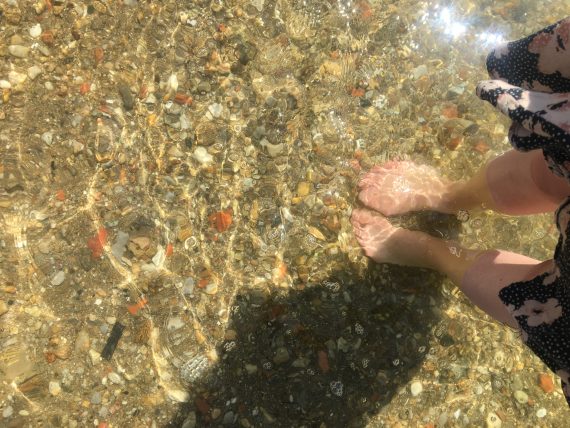
Emily Weaver
Iceland has some of the cleanest water in the world. Not once while I was there did I have to worry about the safety of drinking the water. Walking down the streets of Reykjavik there are drinking spouts that boast of “Pure Icelandic Water”. It didn’t matter what tap I was filling my water bottle from I knew that I would be getting quality water.
“Pure Icelandic Water” is not limited to the water coming out of pipes. Waterfalls, rivers, and streams cover the country. You’ve got several main waterfalls that attract tourists from around the world, like Dynjandi in the Westfjords (pictured below), but they are also likely to pop up coming down random cliff sides as you drive through the country.
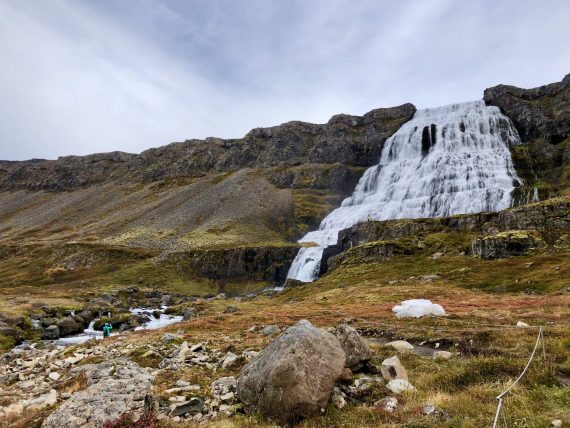
Our first weekend in the country we took a trip out to Hengill geothermal field. Here, we spent the afternoon observing and drawing conclusions about dozens of streams that cross the valley. The geothermal nature of the area allows the streams to range in temperature, causing one stream to be cold while a stream one meter away can run hot. It was here that our advisor told us that he never brings water when going into the field. Instead he takes advantage of the fresh water all around him and refills his water bottle. He encouraged us to do the same, but to make sure that there were no sheep around!
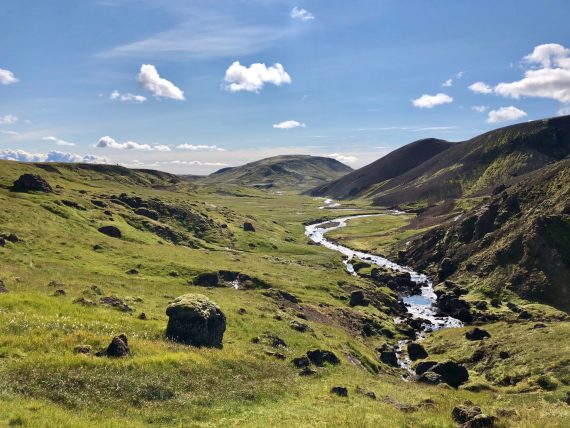
Trey Spadone
Here are some of my experiences with water.
Drinking water At home and at Colgate I am privileged to have access to tap water that is safe to drink. However, in Indonesia the tap water is not for drinking, (unless it is boiled, but waiting for it to cool takes some time). People drink mineral water from bottles, coolers, and these adorable little cups that come with a straw. The main brand is “Aqua” and most people refer to drinking water by that name instead of “air” the Indonesian word for water.
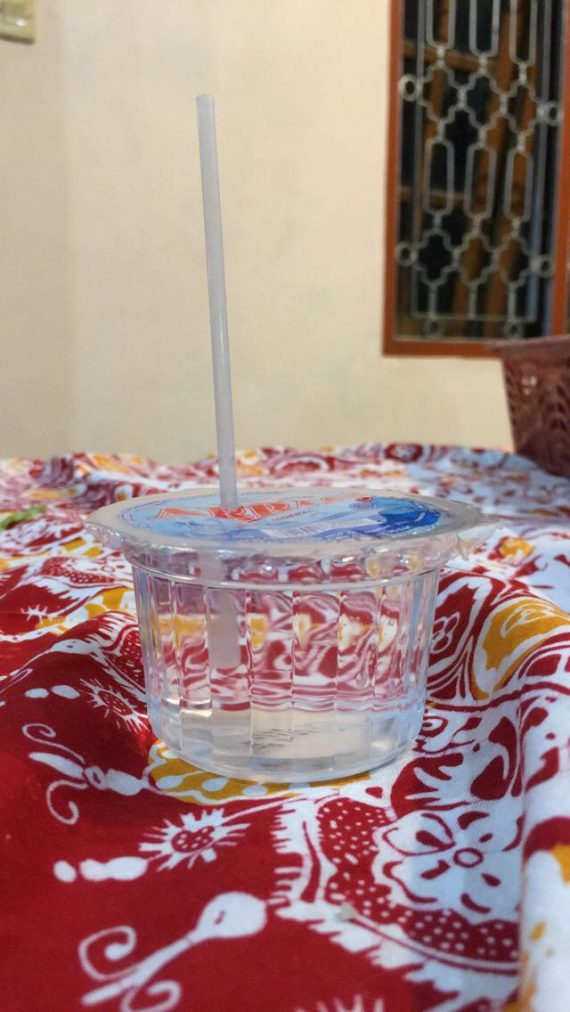
Rain Indonesia has two seasons: dry and rainy. It is currently the rainy season, but thankfully none of our days have been affected by the weather. The rain is a powerful force though. During our first week here I woke up at 3:30am because of loud noises outside. I opened my door and it was absolutely pouring. We stayed in an old palace during orientation and the water from the ground was overflowing onto the walkways. There was a lot of thunder and lightning and for a split second I was afraid that my group had fled and forgot me inside. Luckily, that was not the case.
Bathing It is wicked hot and humid here, so I have taken many showers in the past two weeks. Most people in Indonesia take “bucket showers” which I have grown to enjoy and appreciate. Basically, you have a bucket filled with water and a small container that fits inside. You scoop the water in the small container and pour it over your head and body. The first pour is always a little striking because it is cold, but overall it feels great. Bucket showers are far more efficient than shower head showers and they save water which is great!
Swimming I have been to beautiful black sand beach Kerambitan a couple times now. The temperature of the water is superb which it makes it a treat to swim in. The current is so strong and the waves are so big that at one point I was standing with the water below my knees and after a wave came in the water was higher than my waist. Our teachers have had to call us back a few times to keep us from getting swept away.


